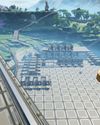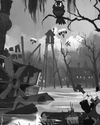
On the ground level, the street that houses Amplitude Studios is a uniform block of contemporary cafés, flats, and office buildings. But stand on the eighth-floor balcony, and the first thing you’ll notice is the 1930s. The concrete dome of the Église du SaintEsprit glints under a Parisian sun, and beyond stands a strange urban mountain, the artificial peak of the Parc Zoologique de Paris. Downwind, on a breezy day, you can smell the monkey feces.
These are the monuments of a people who left their mark on the world. Achievements that survived assimilation into the cultures that followed, becoming part of the fabric of a nation. They are emblematic of Humankind, Sega’s new Civ rival from the makers of Endless Legend.
“The reason we created Amplitude was to make Humankind,” says studio head Romain de Waubert de Genlis. “It was a dream we had, to create a historical 4X game. We knew it was a big task. It’s the Everest of 4X, and you need to learn to climb other mountains first.”
So Amplitude went to space, making its debut with an interstellar empire builder. Then it embraced fantasy, perfecting turn-based expansion across a hexagonal land. The studio dabbled in roguelikes and tower defense for spin-off Dungeons of the Endless and developed a shared universe to encompass all of its games. It established a rare reputation for storytelling in the strategy genre, and for meaningfully involving fans in design decisions. And then Amplitude signed away its independence to Sega.
This story is from the {{IssueName}} edition of {{MagazineName}}.
Start your 7-day Magzter GOLD free trial to access thousands of curated premium stories, and 9,000+ magazines and newspapers.
Already a subscriber ? Sign In
This story is from the {{IssueName}} edition of {{MagazineName}}.
Start your 7-day Magzter GOLD free trial to access thousands of curated premium stories, and 9,000+ magazines and newspapers.
Already a subscriber? Sign In

"The War Within itself has kept me coming back most evenings too"
WORLD OF WARCRAFT remains my jailer, and I couldn't be more pleased about it

OK BUILDER
SATISFACTORY is the new titan in building and crafting games

HELL YES
DIABLO IV: VESSEL OF HATRED is a transformative expansion

MOUSE: PI FOR HIRE
This mouse wants to be more than just a gimmick

WINDBLOWN
Dead Cells dev's new roguelike has me afraid for my free time

NO MORE ROOM IN HELL 2
As the zombie horde surrounded me just moments after taking down my two remaining teammates, the writing was really on the wall. Armed with just a chef's knife, it was clear I stood no chance, but I was going down swinging, hoping for a miracle... it didn't come.

OWNED BY STEAM
VALVE cordially reminds you that your games aren't yours

CURSE OF THE AZURE BONDS
These classic games haven't aged badly, but I sure have.

DEEP FREEZE
Endure a blizzard of tough choices and rough consequences in FROSTPUNK 2

NEW HORIZONS
Building up REMNANT 2 outside the live service game grinder